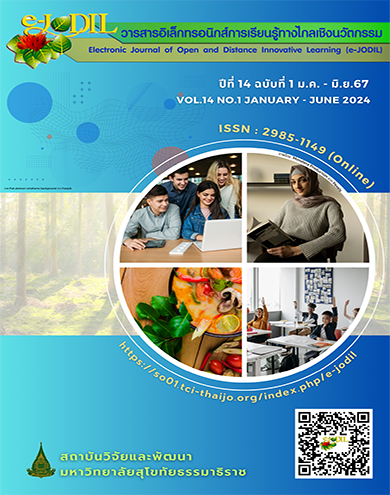การเรียนรู้ตลอดชีวิต: แนวทางการส่งเสริมตามเป้าหมายการพัฒนาที่ยั่งยืนด้านการศึกษา และบทบาทของสถาบันอุดมศึกษา
Main Article Content
บทคัดย่อ
การเรียนรู้ตลอดชีวิตเป็นกระบวนการเรียนรู้ด้วยตนเองในการปรับตัวเพื่อความอยู่รอดของมนุษย์ที่มีต่อการเปลี่ยนแปลงตั้งแต่เกิดจนกระทั่งตาย เป็นเป้าหมายสำคัญด้านการศึกษาที่เน้นพัฒนาคนให้เป็นผู้เรียนรู้ตลอดชีวิตที่สามารถเปลี่ยนแปลงสังคมตามแนวทางของเป้าหมายการพัฒนาที่ยั่งยืน การเปลี่ยนแปลงสำคัญในปัจจุบัน คือ 1) ตลาดแรงงานแบบดิจิทัล และ 2) การเข้าสู่สังคมผู้สูงอายุโดยสมบูรณ์ ทำให้ผู้สูงอายุยังต้องเรียนรู้ พัฒนาทางอาชีพ และฝึกใช้เทคโนโลยีอย่างต่อเนื่อง เพื่อเพิ่มโอกาสการทำงานซึ่งทำให้มีรายได้ สถาบันอุดมศึกษาจึงต้องปรับบทบาทเป็น สถาบันการเรียนรู้ตลอดชีวิต มุ่งส่งเสริมการเรียนรู้ตลอดชีวิตให้กับทุกคนอย่างครอบคลุมและเท่าเทียมกัน โดยมี การเรียนรู้แบบยืดหยุ่น นอกจากการเรียนในระบบปกติ เพื่อตอบสนองความต้องการเรียนรู้ของคนในทุกช่วงวัยและพัฒนาคนได้ตอบโจทย์ความต้องการ 1) หลักสูตรต้องร่วมมือกับภาคอุตสาหกรรมและขยายการมีส่วนร่วมกับสังคมทุกภาคส่วน 2) ใช้เกณฑ์ประกันคุณภาพสร้างความมั่นใจว่าการเรียนรู้มีคุณภาพและเป็นประโยชน์ ส่งผลต่อความน่าเชื่อถือ 3) จัดหาแหล่งเงินทุนอย่างเพียงพอ 4) พัฒนาบุคลากรที่ช่วยผลักดันให้เป็นสถาบันการเรียนรู้ตลอดชีวิต และ 5) ส่งเสริมการใช้เทคโนโลยีเพื่อการศึกษาอย่างทั่วถึง ในการเรียนรู้ ผู้เรียนควรได้รับการปลูกฝังคุณลักษณะเป็นผู้เรียนรู้ตลอดชีวิตตั้งแต่การศึกษาขั้นพื้นฐาน คือ การเรียนรู้ด้วยการนำตนเอง และทักษะด้านการคิด ซึ่งต้องตัดสินใจและแก้ไขปัญหา กระทั่งเข้าเรียนในระดับอุดมศึกษา ผู้เรียนเริ่มเป็นผู้ใหญ่จะมีประสบการณ์มากขึ้น พร้อมเรียนรู้ โดยตระหนักได้ว่าสิ่งไหนสำคัญต่อตนเอง นำมาสู่การมีส่วนร่วมในทุกมิติของการเรียนรู้ ซึ่งส่งผลดีต่อการเรียนรู้แบบยืดหยุ่นของสถาบันอุดมศึกษาและการเป็นผู้เรียนรู้ตลอดชีวิตที่มีคุณภาพที่จะพัฒนาประเทศสู่ความยั่งยืนต่อไป
Downloads
Article Details

อนุญาตภายใต้เงื่อนไข Creative Commons Attribution-NonCommercial-NoDerivatives 4.0 International License.
บทความ ข้อความ ภาพประกอบ ตารางประกอบ ที่ตีพิมพ์ในวารสารเป็นความคิดเห็นและความรับผิดชอบของผู้เขียนแต่เพียงผู้เดียว ไม่เกี่ยวข้องกับมหาวิทยาลัยสุโขทัยธรรมาธิราชแต่อย่างใด
บทความที่เสนอพิจารณาในวารสาร e-JODIL ต้องเป็นบทความที่ไม่เคยส่งไปลงพิมพ์ เผยแพร่ หรืออยู่ระหว่างการพิจารณาของวารสารอื่น
กองบรรณาธิการขอสงวนสิทธิ์ในการพิจารณาและตัดสินการตีพิมพ์บทความในวารสาร
เอกสารอ้างอิง
Ates, H. & Alsal, K. (2012). The importance of lifelong learning has been increasing. Procedia - Social and Behavioral Sciences, 46, 4092-4096.
Beairsto, B. (2000). What Does It Take To Be A Lifelong Learner?. In B. Beairsto and P. Ruohotie (Eds.), Empowering Teachers as Lifelong Learners: Reconceptualizing, Restructuring and Reculturing Teacher Education for the Information Age. Tampere, Finland: University of Tampere.
Centre for SDG Research and Support: SDG Move, the Faculty of Economics, Thammasat University. (2016). SDG Move: Moving Towards Sustainable Future. Retrieved from https://www.sdgmove.com/sdg-101/
Chancharoen, T. (2019). Learning Management for Thai Education 4.0. Journal of Graduate Studies Valaya Alongkron Rajabhat University. 13(3), 216-229.
Department of Older Persons. (2021). Current Aging Society and Economy in Thailand. Retrieved from https://www.dop.go.th/th/know/15/926
Education Technology Development and Integration Support, King Mongkut’s University of Technology Thonburi. (2021). Role of Micro-Credentials in the Digital Age and Thai Education Today. Retrieved from https://www.ets.kmutt.ac.th/post/digital-transformation-microcredential
Kaplan, A. (2016). Lifelong Learning: Conclusions from A Literature Review. International Online Journal of Primary Education, 5(2), 43-50.
Knapper, C. K., & Cropley, A. (2000). Lifelong Learning in Higher Education. London: Kogan Page.
Knowles, M. S. (1980). The Modern Practice of Adult Education: From Pedagogy to Andragogy. Englewood Cliffs: Prentice Hall/Cambridge.
Maclean, R., & Wilson, D. (2009). International Handbook of Education for the Changing World of Work. New York: Springer.
Office of National Higher Education Science Research and Innovation Policy Council. (2021). Adjust the Way to Study in Thailand: Emphasis on Building Skills for Thailand to Keep Up with the Changing World. Retrieved from https://www.nxpo.or.th/th/9456/
Office of the National Education Commission. (2003). National Education Act B.E. 2542 (1999) And Amendments (Second National Education Act B.E. 2545 (2002). Retrieved from https://www.moe.go.th/
Office of the Non-formal and Informal Education. (2008). Promotion of Non-Formal and Informal Education Act, B.E.2551 (2008). Retrieved from https://www.moe.go.th/
Organization for Economic Co-operation and Development. (2007). Education at a Glance 2007: OECD Indicators. Paris. Retrieved from https://www.oecd.org/education/skills-beyond-school/40701218.pdf
Panich, V. (2012). The Way of Learning for Students in the 21st Century. Bangkok: ThaiSSF.
Pattaragoranan, N. (2014). Concepts and Management Techniques of Adult Learning. Journal of Education Silpakorn University. 12(1, 2), 18-29.
Power, C. N., & Maclean, R. (2013). Lifelong Learning: Meaning, Challenges, and Opportunities. In R. Maclean, S. Jagannathan, & J. Sarvi (Eds.), Skills for Inclusive and Sustainable Growth in Developing Asia-Pacific. Dordrecht: Springer.
UNESCO Institute for Lifelong Learning. (2017). Learning cities and SDGS: A guide for Action. Retrieved from https://unesdoc.unesco.org/ark:/48223/pf0000260442
UNESCO Institute for Lifelong Learning. (2022). Making lifelong learning a reality. Retrieved from https://unesdoc.unesco.org/ark:/48223/pf0000381857
United Nation. (2019). The Sustainable Development Goals Report. Retrieved from https://unstats.un.org/sdgs/report/2019/The-Sustainable-Development-Goals-Report-2019.pdf
United Nation. (2022). The Sustainable Development Goals Report. Retrieved from https://unstats.un.org/sdgs/report/2022/The-Sustainable-Development-Goals-Report-2022.pdf
Vaill, P. B. (1996). Learning as a Way of Being: Strategies for Survival in a World of Permanent White Water. San Francisco, CA: Jossey-Bass.


